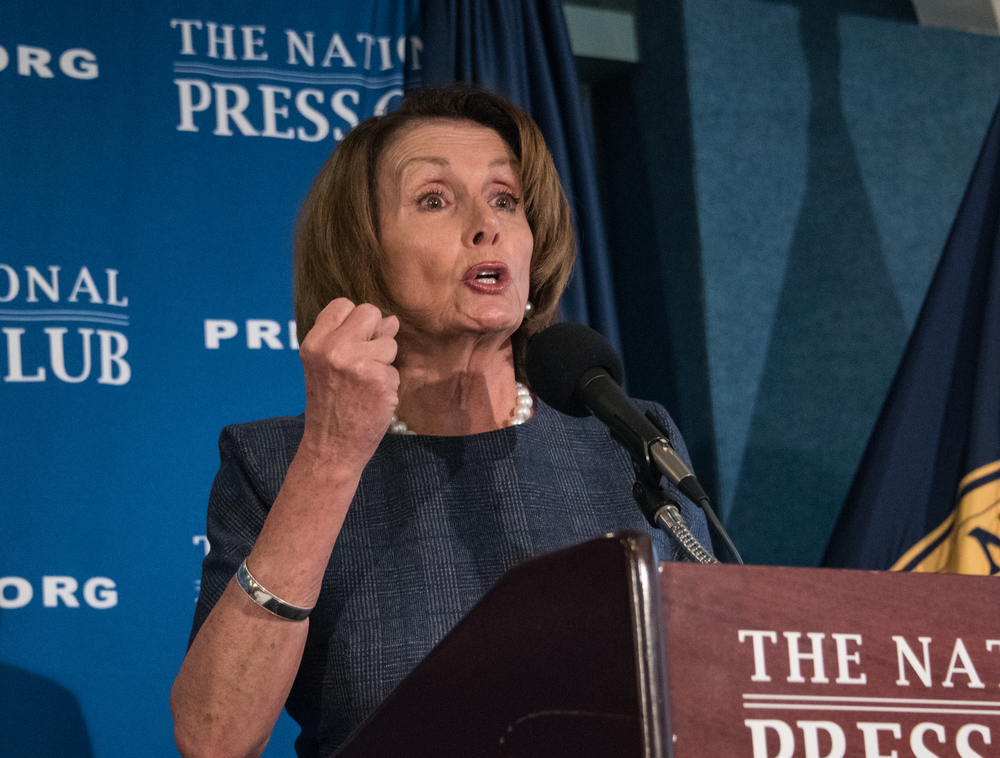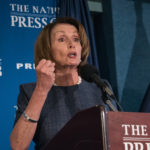Nancy Pelosi visits Taiwan, angering China, which warns she’s ‘playing with fire’

Albert H. Teich / Shutterstock.com
House Speaker Nancy Pelosi landed in Taiwan on Tuesday, a highly anticipated visit amid increasingly harsh warnings of Chinese retaliation and escalating tensions between Washington and Beijing.
Pelosi, wearing a face mask, stepped off the plane around 10:50 p.m. local time and posed for photos with a contingent of Taiwanese officials who greeted her on the tarmac.
In a statement, the California Democrat noted her visit was the first official trip to Taiwan by a U.S. House speaker in 25 years.
“Our congressional delegation’s visit to Taiwan honors America’s unwavering commitment to supporting Taiwan’s vibrant democracy,” Pelosi said in the statement. “America’s solidarity with the 23 million people of Taiwan is more important today than ever, as the world faces a choice between autocracy and democracy.”
China’s Ministry of Foreign Affairs issued a statement minutes after she landed that condemned her visit as “a serious violation” of the one-China principle that maintains Taiwan is part of China.
The statement accused the United States of emboldening “separatist forces” in Taiwan. Pelosi’s visit “has a severe impact on the political foundation of China-U.S. relations and seriously infringes upon China’s sovereignty and territorial integrity,” the ministry said.
“These moves, like playing with fire, are extremely dangerous,” it said.
Pelosi, who has a long record of tangling with Beijing over its human rights record, is the highest-ranking American official to visit the self-governing island since House Speaker Newt Gingrich visited in 1997.
Pelosi’s office would not confirm the travel in advance, citing security protocols, but her travel plans leaked amid rampant speculation about the fallout from such a visit. Even after she landed, her office did not release an official itinerary for her stay in Taiwan. Taiwan’s three largest national newspapers, citing unidentified sources, said she would spend the night there.
Taiwan’s tallest building, Taipei 101, was lit up with welcome messages for the speaker. “Welcome to TW,” one message said. “Thank you,” read another.
Last month, President Joe Biden said, “The military thinks it’s not a good idea right now” for Pelosi to make the trip. Some expressed concern that China could ramp up aggression toward Taiwan.
“The response will almost certainly include a military component,” M. Taylor Fravel, director of the Security Studies Program at the Massachusetts Institute of Technology, wrote in a thread on Twitter. He said China would probably mount a “show of force,” possibly including live fire exercises and a greater military presence within the Taiwan Strait, along with economic and diplomatic actions targeting the island.
Reuters, citing an unnamed source, reported Tuesday that several Chinese warplanes flew close to the median line dividing the Taiwan Strait on Tuesday morning and that several Chinese warships have sailed near the line since Monday.
China views Taiwan as part of its territory, though Taiwan sees itself as a sovereign country. The United States has long embraced a murky middle ground that seeks to support Taiwan without infuriating Beijing.
In an op-ed published in The Washington Post after her arrival, Pelosi said her trip should be seen as “an unequivocal statement that America stands with Taiwan, our democratic partner, as it defends itself and its freedom.”
“By traveling to Taiwan, we honor our commitment to democracy: reaffirming that the freedoms of Taiwan – and all democracies – must be respected,” she wrote.
Pelosi, White House: Visit doesn’t change US policy on Taiwan
Pelosi noted that her visit was one of several congressional delegations to Taiwan, and “it in no way contradicts longstanding United States policy.”
White House officials emphasized that Pelosi’s trip doesn’t change the U.S. stance on Taiwan and said there’s no reason for the visit to cause any escalation of friction.
“Nothing about this potential visit … would change the status quo, and the world should reject any (Chinese) effort to use it to do so,” said John Kirby, the National Security Council coordinator for strategic communications at the White House. “We will not take the bait or engage in saber rattling.”
Kirby noted that other members of Congress have visited Taiwan, including this year.
“We have repeatedly said that we oppose any unilateral changes to the status quo from either side, we have said that we do not support Taiwan independence, and we have said that we expect cross-strait differences to be resolved by peaceful means,” Kirby said.
More than two dozen Senate Republicans released a joint statement after Pelosi’s arrival in Taiwan, voicing their support for her visit.
“This travel is consistent with the United States’ One China policy to which we are committed,” they said.
China’s threats
Despite the administration’s insistence that the visit does not mark a change in U.S. policy, China has threatened consequences for Pelosi’s visit.
In Tuesday’s statement, China’s Foreign Ministry said Beijing “will definitely take all necessary measures to resolutely safeguard its sovereignty and territorial integrity in response to the U.S. speaker’s visit.” Any consequences from those steps “must be borne by the U.S. side and the ‘Taiwan independence’ separatist forces,” the statement reads.
Chinese President Xi Jinping delivered a stark warning directly to Biden over the issue during a lengthy phone call July 28.
“Those who play with fire will perish by it,” the Chinese leader said, according to Beijing’s official account of the conversation. “It is hoped that the U.S. will be clear-eyed about this. The U.S. should honor the one-China principle,” the Chinese government statement said.
U.S. officials have called such comments escalatory.
“Rhetoric of that kind only escalates tensions in a completely unnecessary manner,” Kirby said last week.
Pelosi’s Asia trip
Pelosi’s visit to Taiwan is part of a congressional delegation to Singapore, Malaysia, South Korea and Japan.
Democratic Reps. Gregory Meeks of New York, Mark Takano of California, Suzan DelBene of Washington, Raja Krishnamoorthi of Illinois and Andy Kim of New Jersey traveled with Pelosi.
The California Democrat invited several Republican members of Congress to travel to Taiwan with her, according to a source familiar with the discussions and one of the GOP lawmakers, but none of the GOP members went.
Rep. Michael McCaul, R-Texas, was among those invited on the trip, but he had a prior commitment, said Leslie Shedd, a spokesperson for the ranking member of the House Foreign Affairs Committee.
House Minority Leader Kevin McCarthy, R-Calif., and Senate Minority Leader Mitch McConnell, R-Ky., said before the trip that if Pelosi did not go, it would be a win for China.
Source: USA Today










